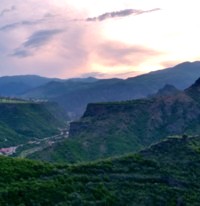Having, in several trips, followed the Silk Road from Xian and Urumqi in China across Tajikistan and Uzbekistan our next visit had to be to the Caucuses. So in May 2019 we purchased an organised tour to Azerbaijan, Georgia and Armenia from ExPat Explore. If this is all that interests you you might want to skip straight to Azerbaijan. Click here...
Geology and pre-history
In geological terms the Caucasus Mountains are very new, resulting of the collision of the Eurasian and Arabian plates that began around 200 million years ago and remains ongoing, generating regular earthquakes and occasional eruptions. The mountains and valleys were glaciated less than 20,000 years ago and are geologically unstable, with high rates of active erosion. So the rivers run grey with silt and pebbles.
Georgian landforms
There are two roughly parallel ranges, like a diagonal slash, with the north-western end on the Black Sea and south-eastern end on the Caspian Sea near Baku. Since prehistoric times they have created a difficult to cross physical barrier between Eastern Europe and Western Asia.
In an early anthropological theory, based on linguistics, it was argued that the Caucuses Mountains must be the origin of the 'Caucasian Race'. Today 'Caucasian' is not considered to be an actual race but a broad medical classification, meaning a white person. Nevertheless modern genetics seems to confirm that white skin is a relatively recent genetic adaptation, enhancing vitamin D production, allowing humans to first inhabit inland areas of northern Europe and Asia, about 12,000 years ago. So all of us with white skin might feel some affinity to these lands.
Until the ice melted a little over ten thousand years ago at the end of the last glaciation, the upland areas were effectively uninhabitable by modern humans. The more mountainous areas still experience heavy snow in winter, limiting agriculture to grazing.
Yet the convoluted twists of these mountains created many separate habitable valleys so, in relative isolation, the early inhabitants developed into many separate communities. Today these groups have coalesced, or have been coerced, into a handful of modern countries, each with several ethnic identities.
As fanatical sporting loyalties demonstrate, the human animal is genetically driven, by survival evolution, to join like-minded groups. Over time these mutually supportive groups develop a common language; and with language comes common beliefs and common cultural traditions.
History shows that these divergent groups don't need much encouragement to make war on each other to: capture sustaining resources; to avenge past insults and injuries; or to honour alliances against a perceived common threat. This is rarely more evident than in the Caucuses.

